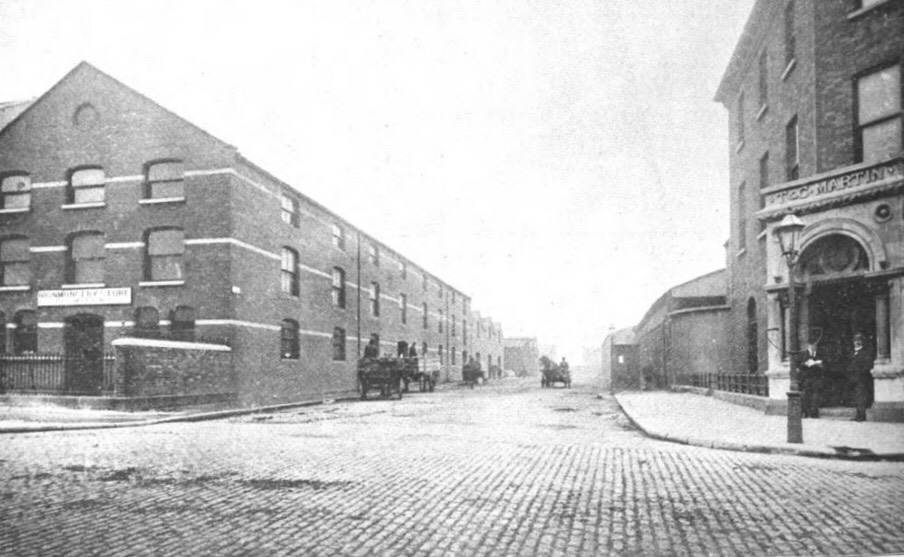
As a new local pub, “The Bottle Boy”,opens at the location of the fondly remembered “Connors” and “Vallence & McGrath” , we take a look back at the history of this address and the drinking establishments which previously stood there.
The origins of a premises at No.81 North Wall Quay is somewhat obscure. In the early 1850s as sites around it were developed into dockside houses it was a vacant lot owned by the Ballast Board. Evidence suggests the current structure may have originally operated as a hotel or lodging house for those conducting business in the Dublin Port area. Among its residents was John Abraham a cattle exporter who also specialised in Clydesdale Horses which he sold from a yard nearby. In 19th and early 20th Century Dublin, the Clydesdale literally was the “work-horse” which drove the Dockland economy, being the preferred horse-power of many of the Dublin Carters which operated in the area for companies such as Pickford’s on Upper Sheriff Street or Wordies in East Wall before the introduction of the motor car. The last Dockland Carter was Paddy Behan who worked for CIE up to the 1970s. A vivid photograph showing Paddy and his cart exiting Castleforbes Road towards Levers still survives from this period.
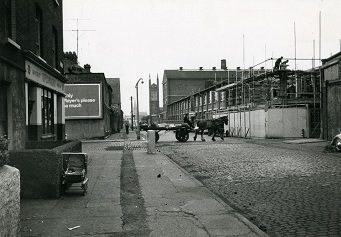
Paddy O’Keeffe exiting Castleforbes Road to make a delivery at Lever’s Castleforbes Works
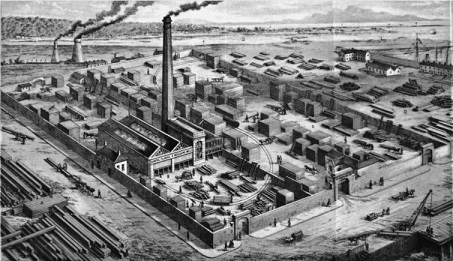
Martin’s Timberworks at what was then Fish Street in 1860
In 1861 the Timber Importer, John Martin acquired a site including 81 and 82 North Wall Quay at the corner of Fish Street (later Castleforbes Road) on a 99 year lease. Martin operated a sawing planning and moulding mills and had an extensive warehouse in the area. Their operation would eventually encompass 15 acres on the North Wall. Martins seemed to have had little use for the property at No. 81 and so the following year it was let to James McDonnell who may have adapted the ground floor street level for retail purposes while continuing to rent out rooms in the premises above. McDonnell already had a presence on the Quay at No.60 with an interest in the Big Tree Pub on Drumcondra Road. The spacious retail premises, subsequently added to 81 at street level, was leased by Andrew Stapleton, a Shipwright and Carpenter with many shipbuilding, repairing, and related nautical businesses popping up in the area at that time. William Buckle, Ship Joiner, took over 81 in 1866. It would be 1873 before McDonnell divested himself of his other interests and took over and ran 81 as a Spirit Grocers and Merchants.

LNWR Passenger Fleet at North Wall with their North Western Hotel in background
However, 1861 is particularly interesting as that year the London and North Western Railway Company (LNWR) moved their operations to the North Wall. McDonnell may well have been anticipating the opportunity to be created by the increased volume of passengers, dockers, and railway workers which would now be passing through, working, or living near that part of the North Wall Quay. McDonnell originally operated at No. 60 as a Vintner or Wine Merchant so it’s likely that his sales were off premises or even wholesale. He may also have been a wine importer. There were several Vintners in the area so there was competition but there was no Spirit Grocers or Public House at the No.81 end of the Quay which was rapidly expanding as the Port grew.
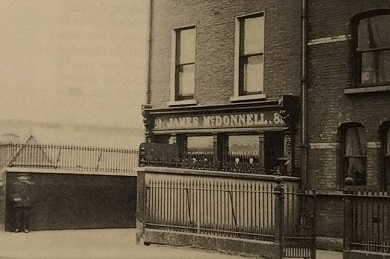
McDonnell’s Public House
Initially McDonnell’s operated as “J. McDonnell, Grocer, Wine, and Spirit Dealer”, a Spirit Grocers or type of General Provisions-shop within which there was a Spirit Counter where alcohol could be purchased either by the bottle or in a glass. However, while drinks could be consumed on the premises it was somewhat different to a Public House insofar as it was illegal to have seats on the premises. Beer was sold; however, it is worth noting that it came in bottles which the “bottle-boy” used fill from the casks provided by the Brewery. Through this practice, strange and often perplexing Guinness labels turn up at auctions and collector’s fairs which confuse as they have a secondary name under the iconic signature of that brewery’s founder.
In 1880 McDonnell took the bold step of closing the Grocer’s end of the business and converted to dealing exclusively in the sale of alcohol. To facilitate this, a business in Nerney’s Court was purchased in order to transfer the license. At the Court Hearing, McDonnell’s barrister, Mr. M’Laughlin Q.C., broke into an impassionate appeal on behalf of himself as a resident of Gardiner’s Row, (which backed onto Nerney’s Court), describing the “infamous and outrageous conduct” of Nerney’s Court residents who frequented the Public House there as akin to that of “wild beasts.” Judging the case, the City Recorder, (no friend to the consumption of alcohol and with a commitment to opposing the opening of new Public Houses where none had existed before), was persuaded that extinguishing the licence at Nerney’s Court would be a mercy to that neighbourhood. Therefore, with so few public houses in the North Wall capable of providing “comfort and refreshment” for a growing population of tradesmen in the area, McDonnell’s ceased to be a Spirits Grocers, and J. McDonnell Wine & Spirit Merchant’s was born.
McDonnell had political ambitions, was active within Charles Stewart Parnell’s Irish Parliamentary Party, and would serve between the 1880s and 90s as a representative for the North Dock Ward on Dublin Corporation. In doing so he paved the way for that legendary North Dock Publican/Politician and Lord Mayor, Alfie Byrne.
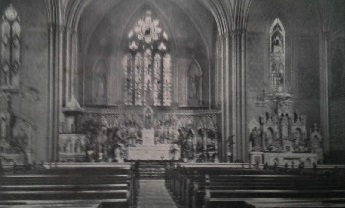
St. Lawrence O’Tool’s Church c.1913
Ever mindful of his civic responsibility, McDonnell was generous of pocket and his name was regularly found on various charity and church-building subscription lists. Among his local donations was the alter rail at St. Lawrence O’Toole’s Church in Seville Place. He served on the Board of the North Richmond Lunatic Asylum for many years and in 1893 was the Honourable Secretary of the Evicted Tenants Fund set up to support those evicted during Parnell’s Boycotting Campaign. During the “Parnell Split” of the Irish Parliamentary Party, McDonnell ran unsuccessfully as a Parliamentary Candidate for the Harbour Division under an Anti-Parnellite ticket. His greatest achievement, he would later claim, was his involvement while a member of Dublin Corporation in the creation of the Fruit and Vegetable Market at Chancery Place.
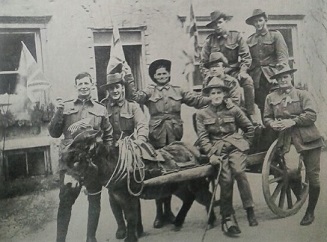
Anzac Soldiers on holidays in Ireland during WWI
James McDonnell died in July 1910 age 83. His son, James McDonnell II, had taken over the business, but he had other interests and soon after leased the pub to a Francis Malone although the McDonnell name remained over the door. Malone in turn appointed a manager, John Shanley to run the Pub. A local, originally from 2 Fish Street (later Castleforbes Road), Shanley had vast experience in the Licensing trade having worked in America, Australia, and New Zealand. Observant to trends, and ever vigilant for opportunity, Shanley noticed the blossoming Tourist Trade in the Docklands driven by companies such as the London and North Western Railway Company. The LNWR had been aggressively promoting Irish Tourism since the time of Queen Victoria and offered a rapid 9 ½ hour journey from London Euston to their station in the North Wall for visitors wishing to explore the Lakes of Killarney, Glendalough, or Dublin itself. Over 1000 soldiers a week passed through the port during the WWI period many of them Anzacs (Australian and New Zealand) visiting their ancestral homeland.
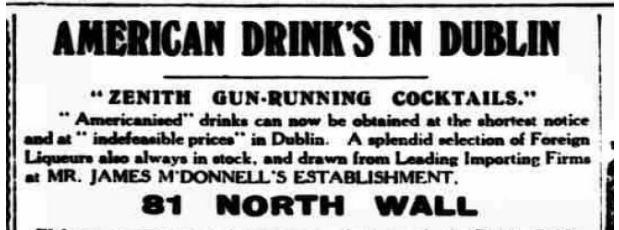
Cocktail Bar Advertisement 1914
For St. Patrick’s Day 1913, Shanley re-launched McDonnell’s as an American Cocktail Bar, announcing an exotic assortment of bottles “now permanently held in stock” which many locals would have struggled to pronounce let alone have tasted before. This was, Shanley would claim, Dublin’s first authentic American style Cocktail Bar, and offered an eclectic menu of over 60 slings, flips, cups, and cobblers, the piece de resistance of which was their own rum based “North Wall Eye Opener.” Shanley claimed all these “amazing concoctions” could be supplied “at a moments notice.” While the Pub had always been popular with tradesmen and sailors this colourful change in direction, serving what they called a “heterogeneous” selection of drinks, meant the Pub avoided being directly caught up in the conflicts experienced by other Dockland establishments during the Great Strike or Lockout of 1913. With a keen marketing eye, as Irish Politics took a dramatic turn in 1914 through events such as the illegal importation of arms at both Larne and Howth, Shanley introduced a new range for his more daring customers known as “The Zenith Gunrunning Cocktails,” while the truly brave could imbibe with an assorted range of Absinth fuelled mixes – all at “indefensible prices!” They even came up with a marketing slogan of “call your beverage and it’s yours in a second!” Given that the First World War broke out in August 1914 it would seem that the “Gunrunners” were later removed from the menu as inappropriate for the time.
It would appear the War years were kind to McDonnell’s with Dublin embracing the “distinct novelty” of their inventive beverages. However, by the early ’20s it had reverted to its roots of being a good old fashioned Public House serving its traditional customer base of Dockers, Stevedores, Merchant Navy men, Railwaymen, and others earning a living in the Docklands. James McDonnell II died in 1930 and with family interests estranged from the business it was set for auction in December that year. It was at this time that it was acquired by its most prominent owner, John O’Connor, who would take over the license on the 5th August 1931. Ironically, although the name over the door would state O’Connor’s, to its faithful regulars it quickly became “Connor’s” the name which would stick – even after it was sold to Limerick man George Vallence and Tipperary man Pat McGrath in 1980.
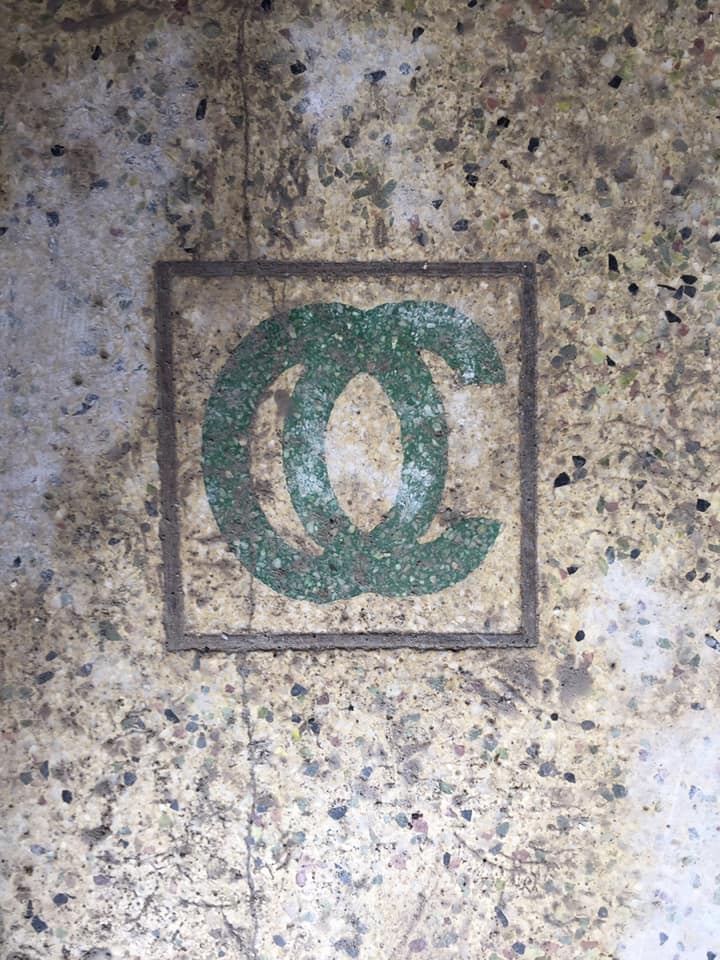
OC Doorstep at entrance
Connors was a Union House and staff had served a six year apprenticeship, wore collars, ties, and waistcoats, and quite often with bar-aprons. All bar staff were addressed as “Mister” save apprentices and the Bottling-Boy who was know by their first name. Harry, the last Bottling Boy at Connors, was nearly 70 when he retired and up to that was a regular feature cycling round the Docklands and East Wall, collecting bottles to be washed, labelled, and filled with beer from the casks.
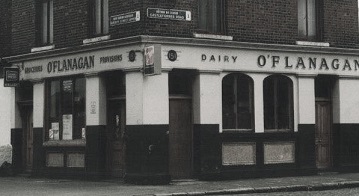
O’Flanagan’s Shop source of legendary Doorstep sandwiches in the Docklands
During its era Pubs were for drinking and no food was served. However during lunchtime customers would often purchase some of the legendary “Doorstep” sandwiches in local shops, made from thick freshly cut slices of Batch Loaf, pale or smoked ham cut directly from the bone, or cheese sliced from great slabs, to which the adventurous might have a generous basting of Colman’s English Mustard, and bring them with them into the pub. Lettuce was optional.

A Traditional Dublin Snug
Pubs were for men only, but as an increasing number of women began to frequent such establishments, the pub acquired a Snug for “the auld ones”, a type of walled compartment with an entrance door, at which there was a hatch at one end providing direct access to the bar. The idea behind the snug was to protect women from the more excessive behaviour of the bar’s male clientele. Although designed to facilitate women visiting such establishments they also made it possible for couples to drink together, a practice which would have been frowned upon in the open bar. A typical snug would sit up to 6-8 people. They were later replaced by the Lounge Bar.

Luke Kelly, Barney McKenna, and The Dubliners
John O’Connor placed great importance on his staff. They had all served an apprenticeship and when he advertised positions vacant he warned the potential candidate’s that their character would have to stand up to the “most strict investigation”. The quality of their service was a sign of their training as was the quality of the pub’s taps maintained by the bottling-boy once draft beer became popular. Connor’s was one of those pubs known for its “Pint” which meant that the beer was worth travelling for despite its somewhat remote location from the city centre. When the beer was good it was an attraction in itself, but one of the bonuses could quite often manifest itself in the arrival of the likes of Barney McKenna, banjo in hand, or the singer Luke Kelly, both searching for a decent pint. As word spread through the neighbourhood the ensuing session would always be memorable. Luke was local and is commemorated today by the powerful Vera Klute statue at nearby Spencer Dock. John O’Connor died in July 1963 swiftly followed by his wife that November. The family maintained an interest in the pub, but it lacked the personal touch of the man who gave it his name. Somewhat shabby and run down it was taken over in 1980 by George Vallence and Pat McGrath in an attempt to restore its fortunes
![[Vallance & McGraths]](http://eastwallforall.ie/wp-content/uploads/2019/12/Valance-McGrath.jpg)
Vallence & McGrath
Under new management the rundown pub was once again given a facelift with comfortable contemporary furniture installed along with a complete revamp of the interior. But somehow the original charm was missing. Recession in the Docklands affected passing trade and as local residents relocated, business slowed down. The opening of the Point Depot (03 Arena) gave footfall a boost and it seemed like the Pub would thrive once more. However, despite the valiant efforts of the new owners, as far as their regular customers were concerned, it would always be known as “Connors” which particularly annoyed Pat McGrath after all the effort he and his partner had put into the business. The Munster publicans were noted supporters of local youth and sports groups as well as local charities and the pub became something of a social centre under the two men. Then in the middle of the economic boom the premises were sold, and the pub closed. Sadly, the expected development never materialised leaving 81 North Wall Quay as just a decaying memory of times past.
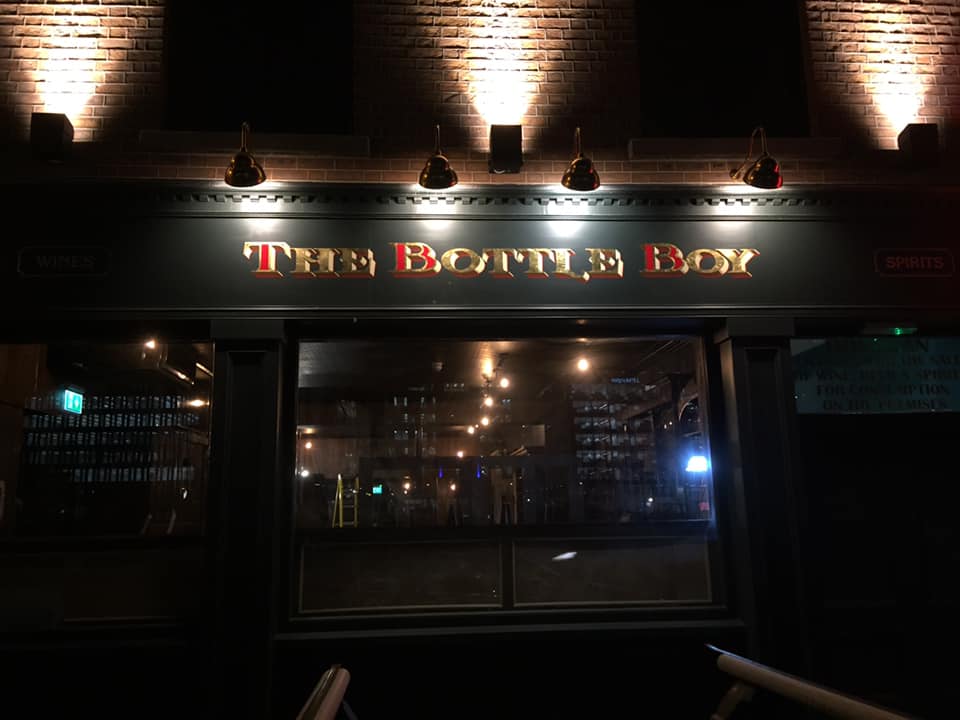 December 2019 sees the return of “Connors” as part of the newly developed Mayson Hotel. The complex acknowledges the area’s maritime heritage with many of their rooms named after renowned Dockers of a bygone era while their intricate wooden floor tiles recalled a local skill of the previous century which was a speciality of T & C Martins timber works. The pub itself pays tribute to the much loved “Harry”, a North and East Wall legend, in its new name “The Bottle Boy” with a terrific selection of old photos of the area’s past adorning its walls. Meanwhile, just over a century after its creation the “North Wall Eye Opener” looks set to welcome guests to the Docklands once more.
December 2019 sees the return of “Connors” as part of the newly developed Mayson Hotel. The complex acknowledges the area’s maritime heritage with many of their rooms named after renowned Dockers of a bygone era while their intricate wooden floor tiles recalled a local skill of the previous century which was a speciality of T & C Martins timber works. The pub itself pays tribute to the much loved “Harry”, a North and East Wall legend, in its new name “The Bottle Boy” with a terrific selection of old photos of the area’s past adorning its walls. Meanwhile, just over a century after its creation the “North Wall Eye Opener” looks set to welcome guests to the Docklands once more.
For corrections , clarifications or further information please contact eastwallhistory@gmail.com .
Any personal recollections of these pubs or the general area also welcome .
 December 2019 sees the return of “Connors” as part of the newly developed Mayson Hotel. The complex acknowledges the area’s maritime heritage with many of their rooms named after renowned Dockers of a bygone era while their intricate wooden floor tiles recalled a local skill of the previous century which was a speciality of T & C Martins timber works. The pub itself pays tribute to the much loved “Harry”, a North and East Wall legend, in its new name “The Bottle Boy” with a terrific selection of old photos of the area’s past adorning its walls. Meanwhile, just over a century after its creation the “North Wall Eye Opener” looks set to welcome guests to the Docklands once more.
December 2019 sees the return of “Connors” as part of the newly developed Mayson Hotel. The complex acknowledges the area’s maritime heritage with many of their rooms named after renowned Dockers of a bygone era while their intricate wooden floor tiles recalled a local skill of the previous century which was a speciality of T & C Martins timber works. The pub itself pays tribute to the much loved “Harry”, a North and East Wall legend, in its new name “The Bottle Boy” with a terrific selection of old photos of the area’s past adorning its walls. Meanwhile, just over a century after its creation the “North Wall Eye Opener” looks set to welcome guests to the Docklands once more.













![[Vallance & McGraths]](http://eastwallforall.ie/wp-content/uploads/2019/12/Valance-McGrath.jpg)